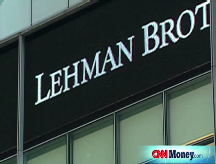Goldman and Morgan: The anti-Lehman
It won't be a banner quarter for either firm - analysts expect earnings to drop sharply. But experts predict that both will at least remain profitable.
NEW YORK (CNNMoney.com) -- Lehman Brothers confirmed investors' worst fears about the depths of the credit crunch on Wednesday. Next week, Goldman Sachs and Morgan Stanley will try and reassure the market that not everyone on Wall Street is suffering.
While Lehman Brothers (LEH, Fortune 500) owned up to a nearly $4 billion loss in the third quarter, marking the second straight quarter of red ink, crosstown rivals Goldman Sachs (GS, Fortune 500) and Morgan Stanley (MS, Fortune 500) are both expected to remain profitable once again.
Even though analysts aren't expecting any major bombshells from Goldman or Morgan, they aren't exactly optimistic either.
Analysts have steadily lowered their earnings forecasts for the two investment-banking giants in recent weeks.
According to consensus estimates from Thomson Reuters, analysts expect Goldman to report a profit of $1.87 per share, down 69% from a year ago, on Tuesday. A month ago, analysts were forecasting a profit of $3.33 per share for the quarter.
Morgan Stanley, which will report its results Wednesday, is expected to earn 78 cents a share, 43% lower than the same period last year. Analysts were predicting that Morgan Stanley would earn 94 cents a share.
The past three months have been difficult for securities firms. In addition to exposure to toxic mortgage-related assets, they have had to endure wild swings in the equity markets and a virtual halt in investment banking activity.
The number of companies that went public during July and August of this year, for example, is down a staggering 82% from a year ago, according to Renaissance Capital's IPOhome.com.
At the same time, the number of announced mergers worldwide during the third quarter so far is about 50% lower than a year ago, according to deal tracker Dealogic.
"This quarter has obviously been cyclically slow, but it is also seasonally slow in August," said Michael Morris, a senior equity analyst and portfolio manager at Delaware Investments in Philadelphia.
Morris added that since Goldman and Morgan will likely have to mark down the value of credit-related assets in the quarter, "it's not going to be a pretty quarter by any stretch."
Slower activity in private equity, credit derivatives and prime brokerage, which services hedge fund clients, could ding Morgan Stanley's results, according to Richard Bove, an analyst with Ladenburg Thalmann.
And since Goldman Sachs ties more of its business to the stock market than any other of its peers, the sharp drop in stock prices so far this year could certainly hurt the firm's underwriting and trading businesses.
At the same time, both firms remain fairly leveraged, a common borrowing strategy employed by securities firms everywhere, aimed at boosting returns.
That alone could pose a risk for the pair, given how all financial markets have behaved lately, notes Christopher Wiles, a managing director at the Pittsburgh-based Allegiant Asset Management, which owned shares of both Goldman and Morgan as of the end of June.
"All of a sudden you could have a big trading loss because of being on the wrong side of say, an energy trade," said Wiles.
In many ways, third-quarter expectations for Goldman and Morgan are strangely similar to what they were just three months ago - profitable, but hardly the type of performance seen before the credit crisis hit.
"The [question] will be, 'Can they muddle through?' rather than, 'Can they surprise with robust business?'" said Ken Crawford of Argent Capital Management in St. Louis, which manages about $850 million in assets.
Once again, analysts and portfolio managers will be keeping a close eye on both firms' capital levels and outlook for the months ahead, and whether there are new areas of deterioration, such as commercial real estate.
But what has, and will, most likely, save both Morgan Stanley and Goldman Sachs from reporting losses is that neither firm bet big on the U.S. housing market in recent years as Lehman, Merrill Lynch (MER, Fortune 500) and Citigroup (C, Fortune 500) did.
As a result, Crawford doubts that either firm will drop a bombshell, such as plans to restructure or raise capital.
"I think the market would be kind of surprised," he said. ![]()



